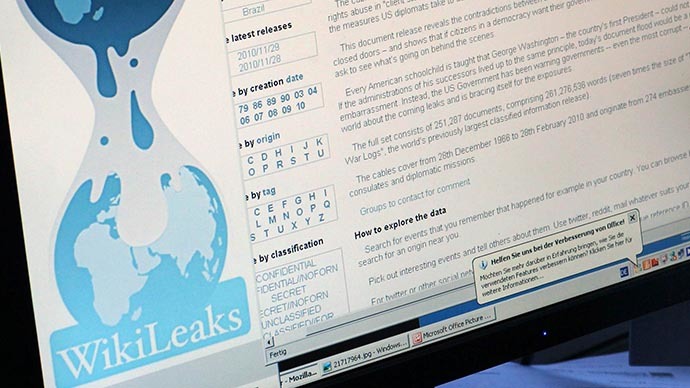WikiLeaks claims Google director helped the NSA spy on Afghanistan

Transparency group WikiLeaks blasted fellow secret-spillers The Intercept last week for censoring the name of a country targeted by United States surveillance. WikiLeaks alleges the nation to be Afghanistan, but the story might not stop right there.
When journalist Glenn Greenwald and the co-authors of last week’s article in The Intercept wrote about the latest US National Security Agency spy operation to be leaked, they alleged that the NSA has been collecting the contents seemingly of all cell phone calls dialed or received in two nations: the Bahamas, and an unnamed “country X.” After scolding The Intercept for withholding the name of that second country, WikiLeaks alleged on Friday that the other subject of the previously unreported NSA program was Afghanistan.
“WikiLeaks has confirmed that the identity of victim state is Afghanistan,” editor-in-chief Julian Assange wrote. “This can also be independently verified through forensic scrutiny of imperfectly applied censorship on related documents released to date and correlations with other NSA programs.”
According to WikiLeaks, there may be much more to the story. Also last week, the anti-secrecy group tweeted that Jared Cohen — the 32-year-old current director of Google Ideas and a former US State Department advisor — has a history that connects him to a program that may have put Afghan signals intelligence, or SIGINT, into the hands of US investigators.
On the morning of May 23, WikiLeaks directed its Twitter followers to a July 2009 State Dept. cable included within a trove of classified documents supplied by imprisoned intelligence source Chelsea Manning the following year.
“Google Idea's director Jared Cohen was tasked with getting Afghan telcos to move towers to US bases when at DoS,” WikiLeaks tweeted.
Google Idea's director Jared Cohen was tasked with getting Afghan telcos to move towers to US bases when at DoS https://t.co/bwVvyXuMU4
— WikiLeaks (@wikileaks) May 23, 2014
Paul Carr, a blogger at Pando Daily, wrote last week that he was unsuccessful with his attempts to get Cohen to comment about the allegations. Nevertheless, the cable referenced by WikiLeaks does indeed connect him, to a degree, with an Afghan SIGINT operation that may have something to do with the NSA program that collects the contents of phone calls.
“From July 8-11, SRAP [Special Representative for Afghanistan and Pakistan] Special Advisor Ashley Bommer and S/P staffer Jared Cohen met with US Forces-Afghanistan (USFOR-A) officials and the mobile service providers to discuss the possibility of placing telecommunications towers on US Military's Forward Operating Bases (FOBs) or other secure locations,” it reads in part.
According to the confidential State Dept. dispatch, major Afghan telecom Roshan was “keen to develop this partnership with the [US government]” and viewed it “as a way to promote mutual security, communications and commercial strategies for Afghanistan.”
If Roshan should agree to a draft proposal then in the works, the cable continued, the telecom would lease space to US forces to erect mobile phone towers through Afghanistan.
The cable continued:
“Although Roshan officials told USG officials that they are ready to sign an agreement with USFOR-A, the other three MSPs have demonstrated only mild interest. Afghan Wireless Communication Co (AWCC) was the only other provider represented at the meetings. Though AWCC Managing Director Amin Ramin told Emboff that they were interested in the proposal, Ramin stopped short of agreeing to partner with the USG. Minister Sangin told Ambassador Wayne that he supports the concept but does not believe that building towers on secure locations will solve the threat issue because the insurgents do not threaten companies when they are building towers. He said companies face insurgent threats when they are transporting equipment and workers to cell tower sites. Sangin said an alternate plan would be to have movable cell towers in reserve as available replacements when insurgents attack cell towers.”
“We support their development and advocate bringing all key Afghan government stakeholders to discussions,” former US ambassador to Afghanistan and State Dept. staffer Karl Eikenberry wrote at the bottom of the memo. “The Ministries of Interior and Defense have not so far been included in discussions about co-locating cell towers on secure locations but will need to be brought into the discussion.”
Of course, WikiLeaks likely has a bone to pick with Cohen, who co-wrote The New Digital Age with Google CEO Eric Schmidt last year: a book which included criticism aimed at Assange and others who endorse full-on data permanence as a solution for increased transparency.
"Despite some of the known negative consequences of this movements (threats to individual security, ruined reputations and diplomatic chaos), some free-information activists believe the absence of a delete button ultimately strengthens humanity's progress toward greater equality, productivity and self-determination,” Schmidt and Cohen wrote. “We believe, however, that this is a dangerous model, especially given that there is always going to be someone with bad judgment who releases information that will get people killed. This is why governments have systems and valuable regulations in place that, while imperfect, should continue to govern who gets to make the decision about what is classified and what is not.”
Regardless, WikiLealks raises interesting points, at least, about Cohen’s work with the Department of State. Additionally, further open source investigation connects other nodes even further with regards to a NSA program that collects the communications of Afghans, as alleged.
Roshan — the telecom revealed to have been ready to sign a deal with the US government in 2009, according to the State Dept. cable — emerges in other documents pertaining to NSA surveillance. Among those are classified documents leaked by former NSA contractor Edward Snowden about BOUNDLESSINFORMANT: one of the agency’s SIGINT collection operations.
According to NSA documents published last year, BOUNDLESSINFORMANT helps the NSA collect signals intelligence across Afghanistan, including at a facility code-named SHIFTINGSHADOW that reportedly targets Roshan specifically, according to documents.
Even still, Roshan is referenced in even more WikiLeaks materials, including Afghan war documents also provided by Manning before her arrest in 2010.In one war log from 2008, for instance, a US military official notes that Roshan is “used extensively” by the International Security Assistance Force, and was likely a target of SIGINT surveillance carried out by Russia, China, Pakistan, India and others.














